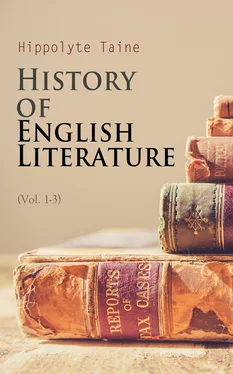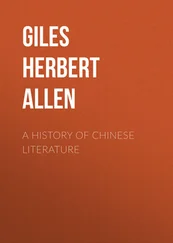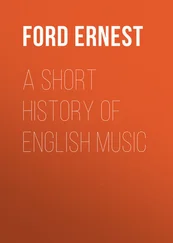"Throw off his golden mitre, rend his stole,
And in the channel christen him anew." [442]
Then, when the queen supplicates:
"Fawn not on me, French strumpet! get thee gone....
Speak not unto her: let her droop and pine." [443]
Furies and hatreds clash together like horsemen in battle. The Earl of Lancaster draws his sword on Gaveston to slay him, before the king; Mortimer wounds Gaveston. These powerful loud voices growl; the noblemen will not even let a dog approach the prince, and rob them of their rank. Lancaster says of Gaveston:
"... He comes not back,
Unless the sea cast up his shipwrack'd body.
Warwick. And to behold so sweet a sight as that, There's none here but would run his horse to death." [444]
They have seized Gaveston, and intend to hang him "at a bough"; they refuse to let him speak a single minute with the king. In vain they are entreated; when they do at last consent, they are sorry for it; it is a prey they want immediately, and Warwick, seizing him by force, "strake off his head in a trench." Those are the men of the Middle Ages. They have the fierceness, the tenacity, the pride of big, well-fed, thorough-bred bull-dogs. It is this sternness and impetuosity of primitive passions which produced the Wars of the Roses, and for thirty years drove the nobles on each other's swords and to the block.
What is there beyond all these frenzies and gluttings of blood? The idea of crushing necessity and inevitable ruin in which everything sinks and comes to an end. Mortimer, brought to the block, says with a smile:
"Base Fortune, now I see, that in thy wheel
There is a point, to which, when men aspire,
They tumble headlong down: that point I touch'd,
And, seeing there was no place to mount up higher,
Why should I grieve at my declining fall?—
Farewell, fair queen; weep not for Mortimer,
That scorns the world, and, as a traveller,
Goes to discover countries yet unknown." [445]
Weigh well these grand words; they are a cry from the heart, the profound confession of Marlowe, as also of Byron, and of the old sea-kings. The northern paganism is fully expressed in this heroic and mournful sigh: it is thus they imagine the world so long as they remain on the outside of Christianity, or as soon as they quit it. Thus, when men see in life, as they did, nothing but a battle of unchecked passions, and in death but a gloomy sleep, perhaps filled with mournful dreams, there is no other supreme good but a day of enjoyment and victory. They glut themselves, shutting their eyes to the issue, except that they may be swallowed up on the morrow. That is the master-thought of "Doctor Faustus," the greatest of Marlowe's dramas: to satisfy his soul, no matter at what price, or with what results:
"A sound magician is a mighty god....
How am I glutted with conceit of this!...
I'll have them fly to India for gold,
Ransack the ocean for orient pearl....
I'll have them read me strange philosophy,
And tell the secrets of all foreign kings;
I'll have them wall all Germany with brass,
And make swift Rhine circle fair Wertenberg....
Like lions shall they guard us when we please;
Like Almain rutters with their horsemen's staves,
Or Lapland giants, trotting by our sides;
Sometimes like women, or unwedded maids,
Shadowing more beauty in their airy brows
Than have the white breasts of the queen of love." [446]
What brilliant dreams, what desires, what vast or voluptuous wishes, worthy of a Roman Cæsar or an Eastern poet, eddy in this teeming brain! To satiate them, to obtain four-and-twenty years of power, Faustus gave his soul, without fear, without need of temptation, at the first outset, voluntarily, so sharp is the prick within:
"Had I as many souls as there be stars,
I'd give them all for Mephistophilis.
By him I'll be great emperor of the world,
And make a bridge thorough the moving air....
Why shouldst thou not? Is not thy soul thine own?" [447]
And with that he gives himself full swing: he wants to know everything, to have everything; a book in which he can behold all herbs and trees which grow upon the earth; another in which shall be drawn all the constellations and planets; another which shall bring him gold when he wills it, and "the fairest courtezans"; another which summons "men in armour" ready to execute his commands, and which holds "whirlwinds, tempests, thunder and lightning" chained at his disposal. He is like a child, he stretches out his hands for everything shining; then grieves to think of hell, then lets himself be diverted by shows:
" Faustus. O this feeds my soul! Lucifer. Tut, Faustus, in hell is all manner of delight. Faustus. Oh, might I see hell, and return again, How happy were I then!..." [448]
He is conducted, being invisible, over the whole world: lastly to Rome, amongst the ceremonies of the pope's court. Like a schoolboy during a holiday, he has insatiable eyes, he forgets everything before a pageant, he amuses himself in playing tricks, in giving the pope a box on the ear, in beating the monks, in performing magic tricks before princes, finally in drinking, feasting, filling his belly, deadening his thoughts. In his transport he becomes an atheist, and says there is no hell, that those are "old wives' tales." Then suddenly the sad idea knocks at the gates of his brain.
"I will renounce this magic, and repent...
My heart's so harden'd I cannot repent:
Scarce can I name salvation, faith, or heaven,
But fearful echoes thunder in mine ears,
'Faustus, thou are damn'd!' then swords and knives,
Poison, guns, halters, and envenom'd steel
Are laid before me to despatch myself;
And long ere this I should have done the deed,
Had not sweet pleasure conquer'd deep despair.
Have not I made blind Homer sing to me
Of Alexander's love and Œnon's death?
And hath not he, that built the walls of Thebes
With ravishing sound of his melodious harp,
Made music with my Mephistophilis?
Why should I die, then, or basely despair?
I am resolv'd; Faustus shall ne'er repent.—
Come Mephistophilis, let us dispute again,
And argue of divine astrology.
Tell me, are there many heavens above the moon?
Are all celestial bodies but one globe,
As is the substance of this centric earth?..." [449]"One thing... let me crave of thee To glut the longing of my heart's desire.... Was this the face that launch'd a thousand ships, And burnt the topless towers of Ilium? Sweet Helen, make me immortal with a kiss! Her lips suck forth my soul: see, where it flies!— Come, Helen, come, give me my soul again. Here will I dwell, for heaven is in these lips, And all is dross that is not Helena.... O thou art fairer than the evening air Clad in the beauty of a thousand stars!" [450]
Читать дальше












